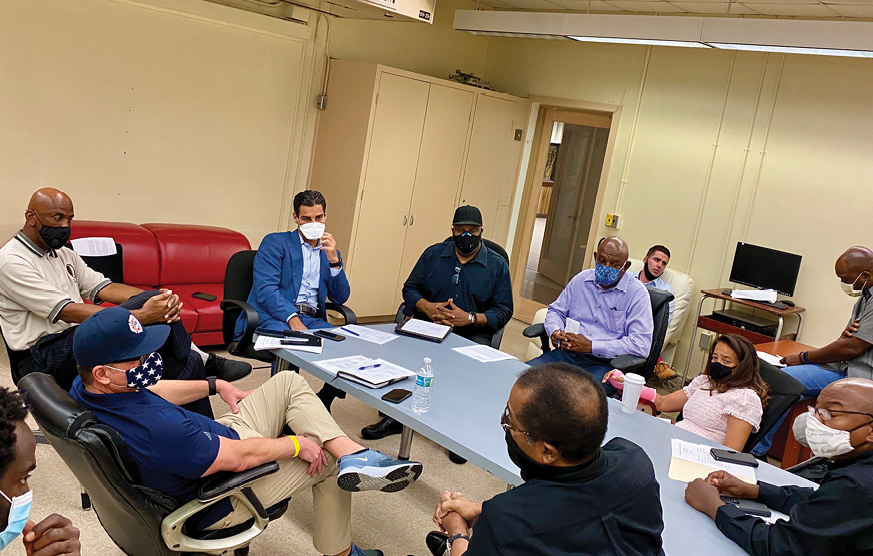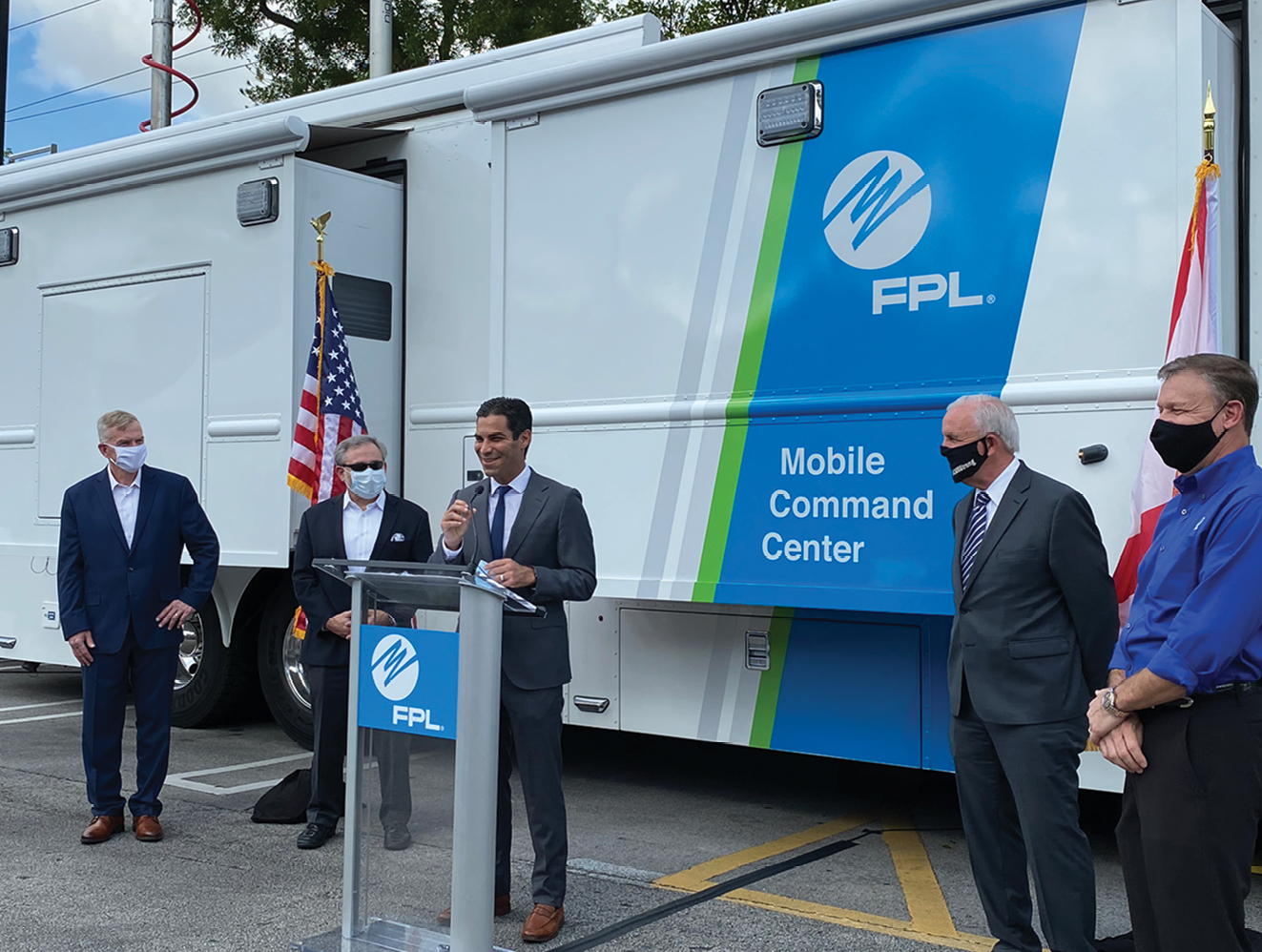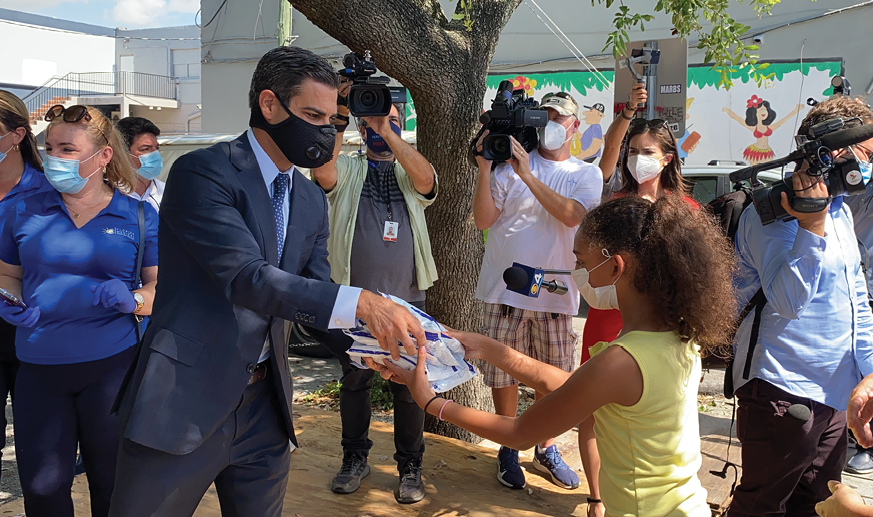- Home
- Media Kit
- Current Issue
- Past Issues
- Ad Specs-Submission
- Ad Print Settings
- Reprints (PDF)
- Photo Specifications (PDF)
- Contact Us

![]()
ONLINE

Servant Leadership
EDITORS’ NOTE
Prior to being elected with 86 percent support from Miami residents, Mayor Suarez served as Miami Commissioner for District 4 for eight years and achieved many legislative accomplishments, including implementing ShotSpotter technology in the City, a state-of-the-art gunshot detection system, setting up a transportation trust fund which allocates funds for current and future transit projects, and passing the Reverse Redline legislation authorizing lawsuits against several major banks for discriminatory mortgage lending practices. Mayor Suarez also serves as Chair of the Environment Committee and is currently the Second Vice-President of the U.S. Conference of Mayors and will become President in 2022. In these capacities, he takes a leading role in collaborating with fellow mayors from around the country to preserve the environment and develop programs and policies that directly benefit the City of Miami. Mayor Suarez also serves as Vice-Chair of the Miami-Dade Transportation Planning Organization (TPO) and is the former President of the Miami-Dade County League of Cities. In his role at the TPO, Mayor Suarez championed the Strategic Miami Area Rapid Transit (SMART) Plan, which was unanimously approved. The SMART Plan expands mass transit options in Miami-Dade County through six main corridors as well as new bus routes to ease traffic congestion and support future population growth. Mayor Suarez helped negotiate the Tri-Rail connection to Downtown, offering free ridership to Overtown residents for life. As the son of former City of Miami Mayor Xavier Suarez, he was exposed to public service since he was a child, growing up around his father’s office at City Hall, the same one he works out of today. Mayor Suarez earned a bachelor’s degree in finance from Florida International University, graduating in the top 10 percent of his class. He went on to receive his law degree from the University of Florida’s Frederic G. Levin College of Law, where he graduated cum laude.

Mayor Suarez meeting with the Circle of Brotherhood
and other leaders of the black community
following the June protests.
What attracted you to public service and interested you in becoming Mayor of Miami?
People. I love people and I love problem solving. Throughout my life I have seen how local leaders more than anyone can improve people’s lives.
Will you highlight the Global Commission on Adaptation and its mission?
I am and have always been a champion of the cause. Being born and raised in Miami, climate change has been on the forefront of my mind for essentially my entire life and I will always be a vocal advocate of the mission.
How do you describe your leadership style and what do you see as the keys to effective leadership?
I believe in the servant-leader model of leadership. I believe the best type of mayor is one who seeks to uplift people and make their quality of life better and sometimes that requires tough decisions. Any true version of leadership requires a servant’s heart and an ability to adapt to the situation at hand.

Mayor Suarez joins U.S. Department of Energy Secretary
Dan Brouillette for a tour of the Florida Power & Light campus.
What have been the keys to driving action and change in Miami with the deep partisanship that exists in the country today?
Focusing on supporting and benefitting our residents is the key to maintaining effective leadership and avoiding distractions. This is not a partisan office, and there’s a reason for that. This office, my administration and the ones that preceded me, has a rich history of putting people over politics.
How do you define resilience and how critical is resilience in addressing crises?
Resiliency is never just about any one issue. Resiliency means anything that affects quality of life. Resiliency also represents the inner strength to persevere and succeed, and for a city, success means achieving resiliency on all levels.
What do you see as the contribution that Miami can make to build a more resilient world?
One of the most crucial ways Miami can benefit the resiliency cause is by serving as an incubator for NGOs and other governments to test pilot solutions. Miami is uniquely positioned to serve as the host city of the most cutting-edge technologies in the industry.

Mayor Suarez distributing 10,000 masks to
COVID-19 hotspots around the City of Miami.
How do you see your role as the incoming president of the Conference of Mayors and what are your priorities for cities across the country?
Resilience means more than just weather. It includes disasters such as the COVID-19 pandemic and not simply weather events faced only by coastal cities. In my role as President, I’ll be the common denominator among a vibrant spectrum of different cities who all face different issues. As I said, resilience is more than just weather, and I will emphasize its importance for all cities across the Conference of Mayors and across the U.S.
Do you feel it is critical to have collaboration and strong global alliances in order to build a more resilient world?
I think this may be one of the single most important facets encompassed by resiliency. Even within a single city, resilience is a grassroots project. Every resident needs to understand the coordinated effort and similarly, every municipality, every state, and every country needs to work together to come up with creative and innovative solutions for the future.![]()